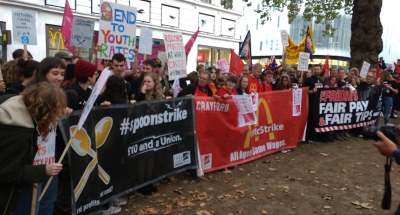Exposing injustice
The coronavirus pandemic is exposing the precarious position of many workers worldwide. As some are forced to continue working in unsafe conditions, others are pushed into poverty, no longer able to work. These impacts are being felt the world over as demand slumps and economies head towards inevitable recession.
Garment workers
Nowhere has this been more keenly felt than in the clothing sector, with workers in UK warehouses and in factories abroad feeling the full force of the economic crisis and corporate malpractice.
Clothing factories in Cambodia, Sri Lanka, Bangladesh, Indonesia, Albania and Central America are closing because of public health concerns, shortages of raw material and falls in orders. Many of those employed are often immigrant workers, paid poverty wages. Many are already in debt or live off each month’s pay and will get little or nothing once their factory shuts.
The situation has been especially dire for those in Myanmar, where 90,000 workers are predicted to lose their jobs in the coming weeks. Garment workers in the country are often recent employees, because most factories have only opened in the last five years, and the turnover of workers is high.
Many are therefore not even entitled to severance pay under Burmese law, which is only granted to those who have worked beyond six months’ probation. Others will get just half a month’s salary for each year employed beyond the initial probation. Those without savings or a safety net will be forced below the poverty line.
Western clothing companies are “exacerbating the economic plight of millions of garment workers in Asia”, Human Rights Watch says. Major fast- fashion brands are cancelling orders and putting payments on hold, fuelling factory closures. Primark alone has put on hold or cancelled $273 million in orders.
New Look has suspended payments for existing stock “indefinitely”.
But these punitive supply chain relationships are not new: fast fashion relies on short-term contracts and fast turnaround times rather than long-term relationships with factories. This uncertainty is passed onto workers, as sweatshops treat their employees as disposable labour so that they can meet this perpetually fluctuating demand.
UK workers are also feeling the impacts. Online fast-fashion retailers ASOS and Boohoo have been criticised for keeping their warehouses open amidst the crisis. More than 98% of 460 ASOS workers who responded to a survey by the GMB union said that they felt unsafe working at the company’s warehouse in Barnsley.





